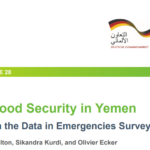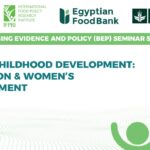the International Food Policy Research Institute (IFPRI) organized the MENA launch event of the 2025 Global Food Policy Report (GFPR) in Cairo, under the title: “Celebrating 10 Years of IFPRI Cairo Office: Informing Food Systems Policy in the MENA Region and Looking to the Future.”
NEW PUBLICATION | Fish for food security in Yemen: Insights from the Data in Emergencies survey
Fish is the most frequently consumed animal-source food in Yemen, apart from dairy. Fish consumption is highest in coastal southern Yemen but also very common in southern inland districts. Nine percent of households in coastal southern Yemen earned income from fishing. Earning fishing income is highly positively associated with consumption of fish or meat and with the frequency of fish or meat consumption. Sustaining fish stocks and fishing livelihoods is critical to food security and nutrition in southern Yemen.
MENA Launch of 2025 Global Food Policy Report (GFPR)
Over the past half century, global food systems have undergone profound changes in response to significant environmental, economic and social shifts. The Middle East and North Africa (MENA) region is no exception, with rapid political, demographic and environmental changes taking place over the past 50 years. IFPRI’s mission is to provide research and evidence to guide policymakers in charting a course through these changes.
NEW PUBLICATION: Regional mapping of anticipatory action capacities in the Near East and North Africa agricultural sector
The Near East and North Africa (NENA) region faces a growing number of complex, overlapping and compounding hazards that are undermining livelihoods, deepening food insecurity and slowing economic development. Increasingly frequent and severe climate extremes – such as droughts, flash floods, heatwaves – are converging with transboundary plant and animal diseases, protracted conflicts and economic volatility. These risks disproportionately impact the agricultural sector, which remains a cornerstone of rural livelihoods and food systems in the region..
BEP Seminar Series | Early Childhood Development: Nutrition and women’s Employment
The labor force participation rate for women in Egypt fell to 18% in 2023.[1] Among the major factors theorized to contribute to this low rate is women’s time spent on care work. While women’s childcare work is undervalued in national GDP accounting, early childhood is a critical stage in human development that shapes the trajectory for individuals’ health, learning, and overall wellbeing throughout their lives. This seminar will bring together completed and emerging research on drivers of women’s employment and time use on the one hand with research and policy discussion regarding early childhood nutrition, nurseries, breastfeeding, and early childhood education.
- 1
- 2
- 3
- …
- 27
- Next Page »





